
Manger and Boire : French Verbs for Eat and Drink
Talking about food and drink is one of the first things you learn when learning French. We all have to eat. And drink. That’s why

Talking about food and drink is one of the first things you learn when learning French. We all have to eat. And drink. That’s why
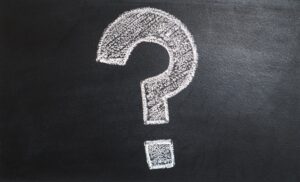
If you want to learn to ask questions using which in French, stay tuned to learn all about it. Expressing “which” in French gets an
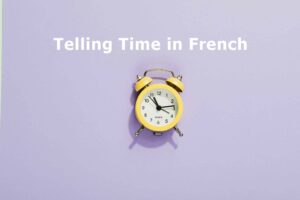
When traveling, meeting up with friends, making appointments, or getting to work or school on time, knowing how to tell the time in French is

People are obsessed with numbers, said the Little Prince. “How tall are you?” “How much do you weigh?” “How many brothers do you have?” “How

Humans think in terms of cause and consequences all the time. Events happen linearly and there’s always a reason behind everything. That is why expressing

When you need to describe something is happening in a certain way, you may want to use “de manière que” in French. As you study

As you might know, the French subjunctive is used after certain expressions that contain a request, a hypothesis, or a wish. You can use this

Knowing how to use “vu que” in a correct manner can help you broaden your grammar knowledge and therefore help you better your French communication

The Complément d’attribution is a grammatical construct that indicates who or what is doing an action in a sentence. It’s an essential topic in French

The Complément du nom Déterminatif (also known as a CND), is a very important element in French that adds specificity to a noun. It helps

French language is full of homophones, or words that sound similar but have different meaning and spelling. That is the case with two very common

Some Fench grammar topics can be very tricky to understand, especially with all the different French complements that can be used in sentences. In this

In French, there are two types of grammatical structures known as compléments de verbs and compléments de phrase. Just like other grammar complements in French,

The world is a contradictory place, and that’s why we should know how to express opposing ideas in French. Also, the French like to argue,

If you have ever wondered why is it sometimes jusque other times jusqu’à, and sometimes even jusqu’à ce que. To express until or till in

Fois is a very common French word, used in different contexts. English speakers oftentimes confuse it with the word “temps”. In this lesson, you’ll learn

When you’re starting to learn French, you realize that there are words that you need to keep in mind because they’re essential to your day-to-day

When you’re learning Fench, you might start to see the expression “à condition que” all the time, this is a very common saying used to

French determinants, or déterminants, have a very important role in French grammar by modifying and specifying nouns in a sentence. And as a French learner,

As you become more and more familiar with the French language, there are words and expressions that you need to remember because they’re essential in

When you’re starting to master French, there are a few expressions that might help you add to your knowledge. Alors que is a saying that

À moins que is an essential French conjunction that can be translated into “unless” in English. One can use this to express conditions or even

“Aussitôt” is a French adverb used to indicate that something happened or is about to happen after another action. This is a word that can

Compound French nouns are a type of noun phrase that consists of several different words. They are more commonly known as “groupes nominaux composés”. Understanding

Mise en Relief is a French grammar technique that can help you elevate your writing by emphasizing certain words or phrases. This tool can make

In French, there are two types of words that play different roles in the way you can form a sentence, mots grammaticaux (grammatical words) and

To become proficient in French, you must know how and when to use the different verbal tenses. This applies to reported speech (or indirect speech)
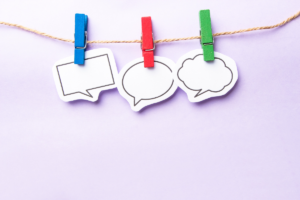
In French, you have two main ways of getting your point across or expressing what someone has said, reported speech and indirect speech. Indirect speech

Prepositions are a very important element in French sentences. They’re essential words that are placed after a verb, a noun, or an adjective in order

Ça marche is a French expression that can be used in a lot of ways depending on the context the speaker uses it. This is

The passive voice is used to avoid mentioning the subject in the sentence and instead place the emphasis on the person or thing affected by

The Participe Présent and the Gérondif are very similar verbal forms, people tend to call them cousin verbal forms. They do have quite a few

Grammatical french expressions are very important terms that are used on a day-to-day basis in French. Today, we’ll talk about the phrase, être en train

The gérondif is a declinable verbal form that replaces the infinitive in certain functions. This verbal form has endings in –ant and is preceded by

Do you ever hear about French construction après avoir fait? This construction is often used in French, so let’s find out if it has an

Do your French sentences sound like they came from a textbook? Expressions like “au lieu de”, “malgré”, “en dépit de”, “par contre”, ” contraire à

How do French conjunctions, seulement, cependant, pourtant, bien que, même si, differ from each other ? Today we will speak about these French conjunctions which

How important are semi-auxiliary verbs in French language and what’s their status? Let’s get in touch with those verbs better and find out their role.

To express emotions in French, you need to employ the subjonctif. You can spot it by looking at the sentence, it’s built with a subjective

When you want to talk about something that happened in the past, you have to make sure you’re using the correct tense: plus-que-parfait with the

You’ve ever wondered how to tell a story in French? How to use time expressions correctly or when to use them at all? Well, French

Accents in French can have a profound effect on pronunciation and meaning. Learners and non-natifs find it quite challenging to see and then remember the

A lot of French sayings are a rich part of their language and culture. And if you’ve ever wondered if you’re using the correct terms,

The French language has no more than 3 types of object complements. You may have heard about COD and COI, but have never crossed the second

We can divide French verbs into two categories, the ones that require direct and the ones that require an indirect object. Perhaps you are well

Although you’ve been learning French for some time, you’re still not sure when to use qui or que. We admit the difference may not be

Are you ready to finally learn to use ce que, ce qui, ce quoi or ce dont ?These words that you often hear are called

Are you tired of speaking only simple sentences in French? Would you like to be able to connect ideas and create a complex sentence? In

Many students have stumbled upon the peculiar French relative pronoun “dont”. It behaves a bit differently than the relative pronouns qui and que, and it

Is telling your address in French becoming a problem because you never know which preposition to use? In this lesson, you’ll learn what French prepositions
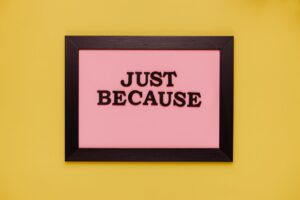
Expressing cause and consequence is an essential part of human thinking. We constantly analyze events and their outcomes, seeking to understand the reasons behind them.

Wondering how to say “There’s nobody in the room”, or “Is there anyone?” We’re here to help you say somebody, anybody, and nobody in French.

One of the 20 most common French mistakes is mixing the future and conditional in French. One is tense, and the other one is the

All languages tend to be pragmatic and save time. If there’s a possibility to turn one meaning into multiple words with different functions, that’s likely

Many French words have similar meanings; are used similarly; and are confused frequently. Prepositions avant and devant are one of them. Stay tuned to avoid

If you want to express a hypothesis (I wish / if only / what if/ in case / suppose (that) in French, what you need

French verb parler is one of the most common French verbs, but it often confuses French beginners because of different prepositions that go along. Today
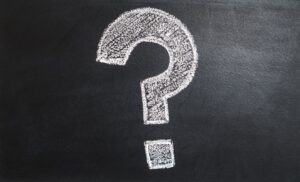
Curious to finally learn how to answer French questions A qui? A quoi ? De qui ? De quoi ? Answering these questions actually helps

Many French learners don’t see the difference between the verbs parler and dire, and who’s to blame them. But, like there’s a difference in English

Want to sound like a native in French? One way is to learn how to use the “y” pronoun. Not using small words like y,

By learning relative pronouns, you are stepping to a higher level of language skills. It means not only you can make a sentence, but now

Forming Plural Nouns and Adjectives in French can be both straightforward and tricky. It all depends on the nature of plural nouns, and adjectives. Some

Whenever you need to connect two ideas, you need conjunction. After you have mastered creating a phrase in French, the next step is creating a

Some French words sound too similar, they are often confused. That’s the case with French prepositions sur and sous. The preposition sur is often equivalent

Have trouble understanding how French people express belonging? In French, we use possessive de. Learning how to express possessive relationships can pose quite a challenge

It’s not always easy for a French learner to choose between par or pour. Because of their similarity, they are often confused. You’ll understand the
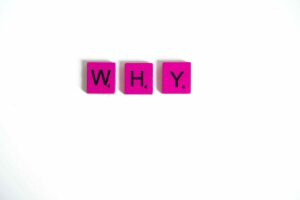
We live in a very causative world. Everything is either the cause or consequence. To learn about the very cause of anything, you need to
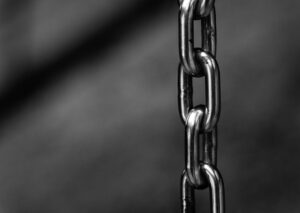
To connect words or even phrases, you’ll need conjunction. The conjunction connects two or more words or phrases that are grammatically equivalent. It doesn’t matter

What’s adjective for nouns, that is the adverb for verbs. Yes, verbs can also be described in its level of intensity, frequency or manner. And

Even though à is a relatively small word, it is an extremely significant French preposition and one of the most important. There are many meanings
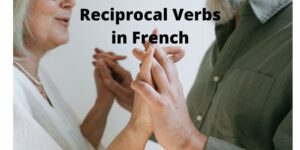
If you are familiar with reflexive verbs in French, les verbes pronominaux, you may have run into reciprocal verbs on the way. They are a

What’s an adjective for nouns, that is the adverb for verbs. Adverbs of place help you set the exact location of where the action happens.
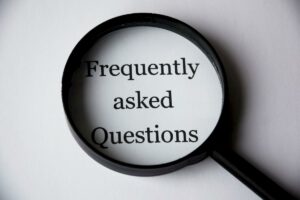
The task of asking a question in French can seem overwhelming at times. If you are a beginner, it is likely that you’ll start with

If you want to express two actions happening simultaneously, you need subordination and conjugation conjunctions. It sounds complex, but trust me, it’s a no-brainer. Alors

When I first learned about il y a in French, it sounded strange. This phrase didn’t seem necessary at first, but the more I read

Have you wondered how to ask who/ whom/ for whom/ with whom/ in French? Today, we’ll explain the relative pronoun qui, and its variants in

What is COD in French? It sounds like some nasty grammar thing. Today, you’ll learn how to use complement object direct properly and stop being

Before, After, Behind, In Front of. Many students find these small words in French confusing because let’s face it, they all look similar. Après, Derrière,

Initially, you might think that quand and lorsque are synonyms in French. It’s true that they can be used interchangeably when they mean “at the

“l like French.” “Me too.” This frequently used reply is used whenever you’d like to make an agreement with the person you are speaking to.

A French question word comment is among the most commonly used in the language, and it has more than one meaning. It can be used

Talking about the Future in French requires you to be familiar with the Future tenses. When French students usually start learning to talk about the

The verbs we examine this time both have the same meaning, but with some obvious differences. They differ in much the same way as to
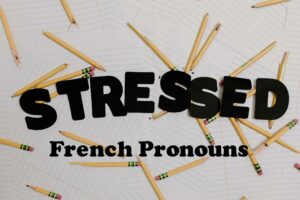
Have you wondered why you need “Moi“, if there is already the pronoun “je“? And what’s the stressed pronoun anyway? Today’s article will help you
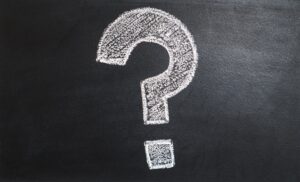
Discussing age in French can get quite tricky. Not because of the grammar, rather culturally. Raising this question can be considered impolite in many cultures.

Movement is an essential part of our lives, and that is why it’s of tremendous importance to learn the verbs related to movements in French.
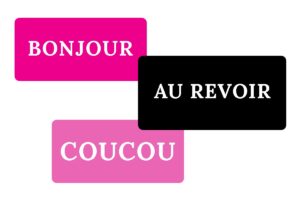
There is more to French greetings than just saying Bonjour. While bonjour is a great choice and is useful in most situations, there are so many other

French nouns can be singular or plural. As each noun requires an article (definite or indefinite), it means they also have a special form to indicate

The French language is one of the languages where nouns have two genders, masculine and feminine. Articles help you determine the gender of the noun,

Ah, l’amour. Throughout history, French has been considered the language of love. I’m not sure, what made France the most romantic country in the world

A good conversation begins with asking questions. It’s the question-answers tandem, that makes the foundation of every communication. In French, there is more than one
Think Languages LLC
1309 Coffeen Ave, Suite 1200, Sheridan WY, USA, 82801
+1 917 9937880